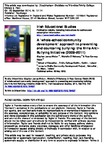A ‘whole-school/community development’ approach to preventing and countering bullying: the Erris Anti-Bullying Initiative (2009–2011)
| dc.contributor.author | Minton, Stephen | |
| dc.contributor.author | O' Mahoney, M | |
| dc.contributor.author | Conway-Walsh, R | |
| dc.date.accessioned | 2019-10-22T12:32:23Z | |
| dc.date.available | 2019-10-22T12:32:23Z | |
| dc.date.issued | 2013-06 | |
| dc.identifier.issn | 0332-3315 | |
| dc.identifier.issn | 1747-4965 | |
| dc.identifier.uri | http://hdl.handle.net/10026.1/15019 | |
| dc.description.abstract |
This paper describes how a 'whole-school/community development' anti-bullying programme was designed, implemented and evaluated in an initiative in Erris, Co. Mayo, Ireland, involving local primary and post-primary schools and community groups. Students from seven participating schools (five primary, two post-primary) completed modified versions of the Olweus Bully/Victim Questionnaire both prior to and following programme implementation. Thereafter, there were reductions in students' reports of involvement in bully/victim problems and increases in their reports of feelings about bullying and countering bullying that were consistent with an anti-bullying ethos. The sizes of these effects were modest, in some cases perhaps due to the significantly low incidence of students' involvement in bully/victim problems prior to the programme. This model is in continued use in Erris, and in its further development it is intended to seek out opportunities to implement and evaluate it in other locations. © 2013 Copyright Educational Studies Association of Ireland. | |
| dc.format.extent | 233-249 | |
| dc.language | en | |
| dc.language.iso | en | |
| dc.publisher | Informa UK Limited | |
| dc.subject | school bullying | |
| dc.subject | anti-bullying programmes | |
| dc.subject | whole-school approach | |
| dc.subject | whole-school | |
| dc.subject | community development approach | |
| dc.title | A ‘whole-school/community development’ approach to preventing and countering bullying: the Erris Anti-Bullying Initiative (2009–2011) | |
| dc.type | journal-article | |
| dc.type | Journal Article | |
| plymouth.author-url | https://www.webofscience.com/api/gateway?GWVersion=2&SrcApp=PARTNER_APP&SrcAuth=LinksAMR&KeyUT=WOS:000320691400008&DestLinkType=FullRecord&DestApp=ALL_WOS&UsrCustomerID=11bb513d99f797142bcfeffcc58ea008 | |
| plymouth.issue | 2 | |
| plymouth.volume | 32 | |
| plymouth.publication-status | Published | |
| plymouth.journal | Irish Educational Studies | |
| dc.identifier.doi | 10.1080/03323315.2013.784637 | |
| plymouth.organisational-group | /Plymouth | |
| plymouth.organisational-group | /Plymouth/Faculty of Health | |
| plymouth.organisational-group | /Plymouth/Faculty of Health/School of Psychology | |
| plymouth.organisational-group | /Plymouth/REF 2021 Researchers by UoA | |
| plymouth.organisational-group | /Plymouth/REF 2021 Researchers by UoA/UoA04 Psychology, Psychiatry and Neuroscience | |
| plymouth.organisational-group | /Plymouth/Users by role | |
| plymouth.organisational-group | /Plymouth/Users by role/Academics | |
| dc.identifier.eissn | 1747-4965 | |
| dc.rights.embargoperiod | Not known | |
| rioxxterms.versionofrecord | 10.1080/03323315.2013.784637 | |
| rioxxterms.licenseref.uri | http://www.rioxx.net/licenses/all-rights-reserved | |
| rioxxterms.type | Journal Article/Review |


